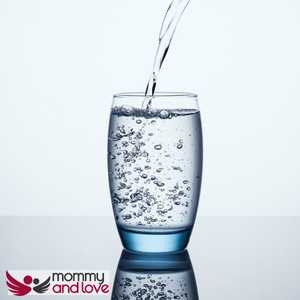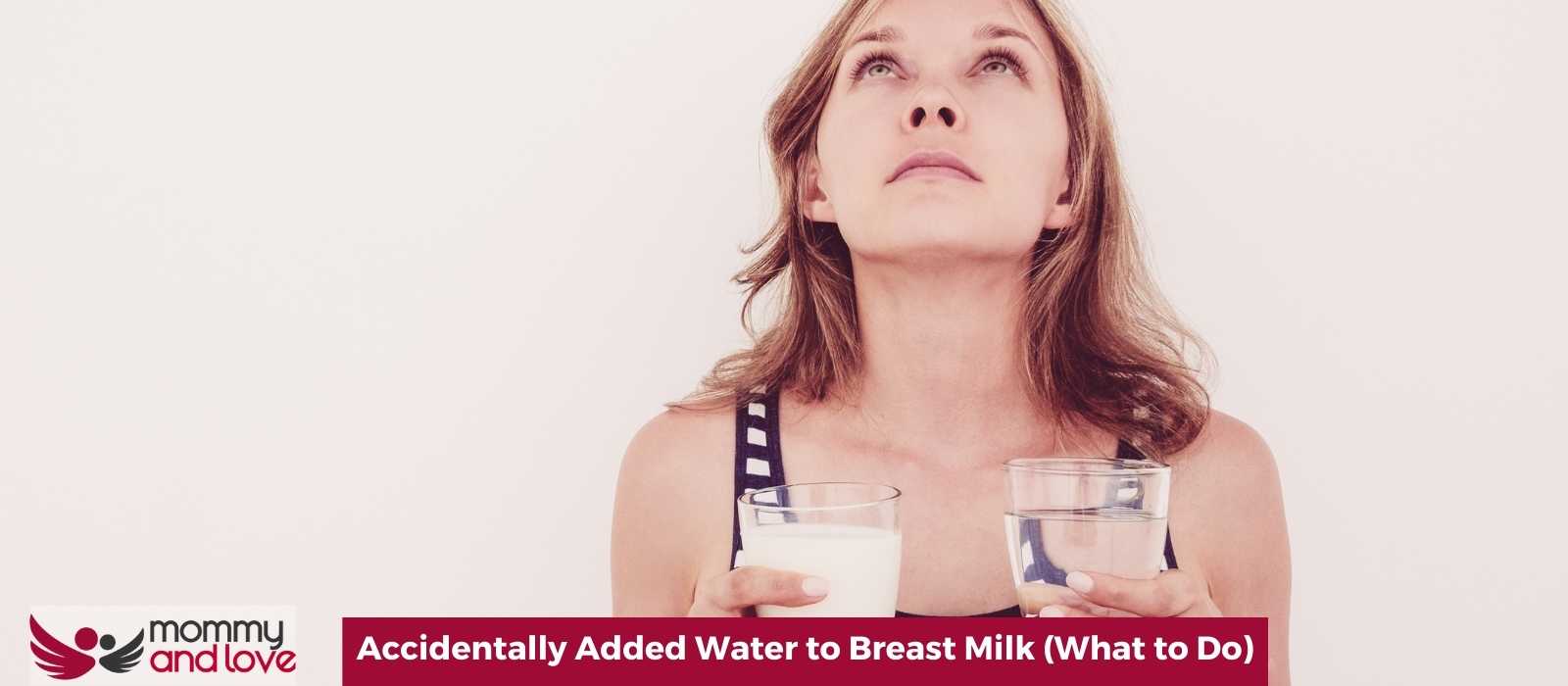Have you ever accidentally added water to breast milk? As a parent can be stressful when you make a mistake like this. It’s an easy mistake to make, but it can have serious consequences to your baby’s growth if you’re not careful.
If your breastmilk has extra water added to it, the sodium levels are going to be lower than usual. It’s not dangerous, but it’s not ideal, because your baby may struggle to digest it and may not get enough vital nutrients.
As a once-off, it’s nothing to panic about, but parents should never dilute infant formula or dilute breastmilk.
Diluting breastmilk or formula regularly may result in a much slower growth rate and in worst case scenarios seizures caused by water intoxication.
What Is Water Intoxication?

If your baby is formula-fed, you will be used to making up feeds- you may have noticed that the instructions are precise, stating how much powder and how much water to mix with.
This is to ensure the optimal blend of nutrients for your baby’s growth.
Adding too much water to bottles throws the balance off- and while this is an error easily made when making up formula feeds, parents might also make this mistake when preparing a feed of expressed breast milk. Never add water to your baby’s breast milk, or extra water to formula.
Parents should know that water intoxication, also known as dilutional hyponatremia, is a potentially fatal disturbance in brain function that occurs when the body takes on too much water. It’s incredibly rare and for the most part easily avoided.
Babies Don’t Need Water Until They Start Eating Solid Food
Water in breast milk can cause the calories and mineral imbalances in the milk not to be absorbed by the body. Pediatricians support the fact that babies don’t need water until they start eating solid food, and even then they only need small amounts. Your breast milk or formula has all the water they need!
A recent study showed that there are almost 300 cases of water intoxication each year in the United States. Even if mothers like to give their baby water because they seem thirsty, it’s best to stick with breast milk or infant formula for babies under 6 months old.
According to the American Academy of Pediatrics, feeding baby plain water is totally unnecessary for breastfed babies.
After 6 months, babies can start drinking small amounts of water, but should not exceed 4-8 ounces per day until they are 12 months old. Be careful to give your baby a balance amount of water.
Overhydration can upset your baby’s electrolyte levels and lead to complications, so only offer them a little bit at a time if you’re worried about dehydration due to hot weather or illness.
Water Intoxication Symptoms
Water intoxication is a condition that occurs when someone drinks too much water. It’s also known as water poisoning, hyponatremia, and dilutional hyponatremia which can cause seizures and may lead to brain damage even death.
Symptoms of water intoxication include headaches, nausea, vomiting, frequent urination, weakness, dizziness, lethargy and confusion.
If it’s severe enough, it can lead to damage to the kidneys, seizures, coma, and even death. It’s important to note that the condition is typically only seen in people who drink enormous amounts of water under certain circumstances—not just in people who drink a lot of water every day.
How Can I Prevent Water Intoxication?
If you have a breastfed baby and are concerned that they may have accidentally been given too much water, don’t worry! It’s not likely to be dangerous, but it can still make your little one uncomfortable.
To help prevent this from happening in the future, here are some things to keep in mind:
Though you can give your baby water with food when they’re older than 6 months, before then it’s unnecessary and can actually dilute the nutrients in their breastmilk.
If you’re giving your baby a formula milk bottle for any reason (maybe to calm them down or comfort them), make sure it doesn’t contain any extra water.
Parents must carefully follow the instructions on the formula pack when making up a feed. You can also avoid mixing altogether if you buy formula milk that’s pre prepared for your convenience.
Your baby can tell you when they’re thirsty by making sucking motions—don’t give them a bottle unless they ask for it.
Water Intoxication Treatment
If you suspect that you or someone else has water toxicity, get medical attention immediately. Mainstream medicine does not have a cure for this —instead, it focuses on arresting the condition’s progression.
Accidental water intoxication can be a scary experience for parents and babies alike. If you are ever in this situation, the most important thing to remember is to stay calm. There are steps you can take to help your baby recover.
The dangers of water toxicity are very real but remember that is is very rare.
If you suspect that your child or someone else has water intoxication, it is important to get medical attention immediately.
How To Fix Breast Milk That Got Mixed With Water or Dilute Infant Formula

If it’s happened already, as a one off, it’s okay if you accidentally added a little water to breast milk.
It’s easy to make mistakes like this, late night feeds combined with a hungry infant daughter or son don’t made for an alert parent!
There is no known supplement to balance water toxicity. Preparation is the key to success in any venture. This is especially true when it comes to feeding your baby. Parents should prepare all bottle feeds, whether breast milk or infant formula, with precision.
If, for example, you’ve realised your mistake while making up the feed, it’s probably best to throw it and start again rather than give the diluted milk. You could also try this wasted breast milk in your child’s bath, or even apply breast milk to baby’s hair to reduce hair loss.
Take Away on Adding Water to Breast Milk or Infant Formula
Mixing breast milk with water is unnecessary and can mess with the balance of salts in your baby’s blood stream, preventing them accessing full nutrition from your milk. Regular bottles can also disrupt moms supply. If you do pump, you can mix breast milk with properly prepared formula, but avoid mixing with tap water.
Ensure to mix formula following the guidelines properly.
The best way to ensure that your baby is getting enough fluids is to put them to the breast on demand.
Though you can give your baby water when they’re older than 6 months, before then it’s unnecessary and can actually dilute the nutrients in their breastmilk. If you’re giving your baby a bottle of water for any reason (maybe to calm them down or comfort them), ensure that it is a tiny amount in small increments.
Your child does not need anything other than formula milk or breast milk for the first 6 months. If you wish to add water before this stage, speak to your pediatrician for advice. It is likely that your pediatrician will recommend that you wait until your infant has started eating solids at around six months of age.
If there is any concern that your infants might have consumed more water than they should have, watch closely for symptoms, ensuring future feedings are properly made up. As a one off, it’s likely to be fine

This article was written by Sandra Baker – full time writer and the mother of four amazing kids (including twins!)
She’s also a breastfeeding counselor and has spent years helping new parents learn how to care for their children. When she’s not writing or caring for her children, Sandra likes to spend time reading and taking walks with her husband.




